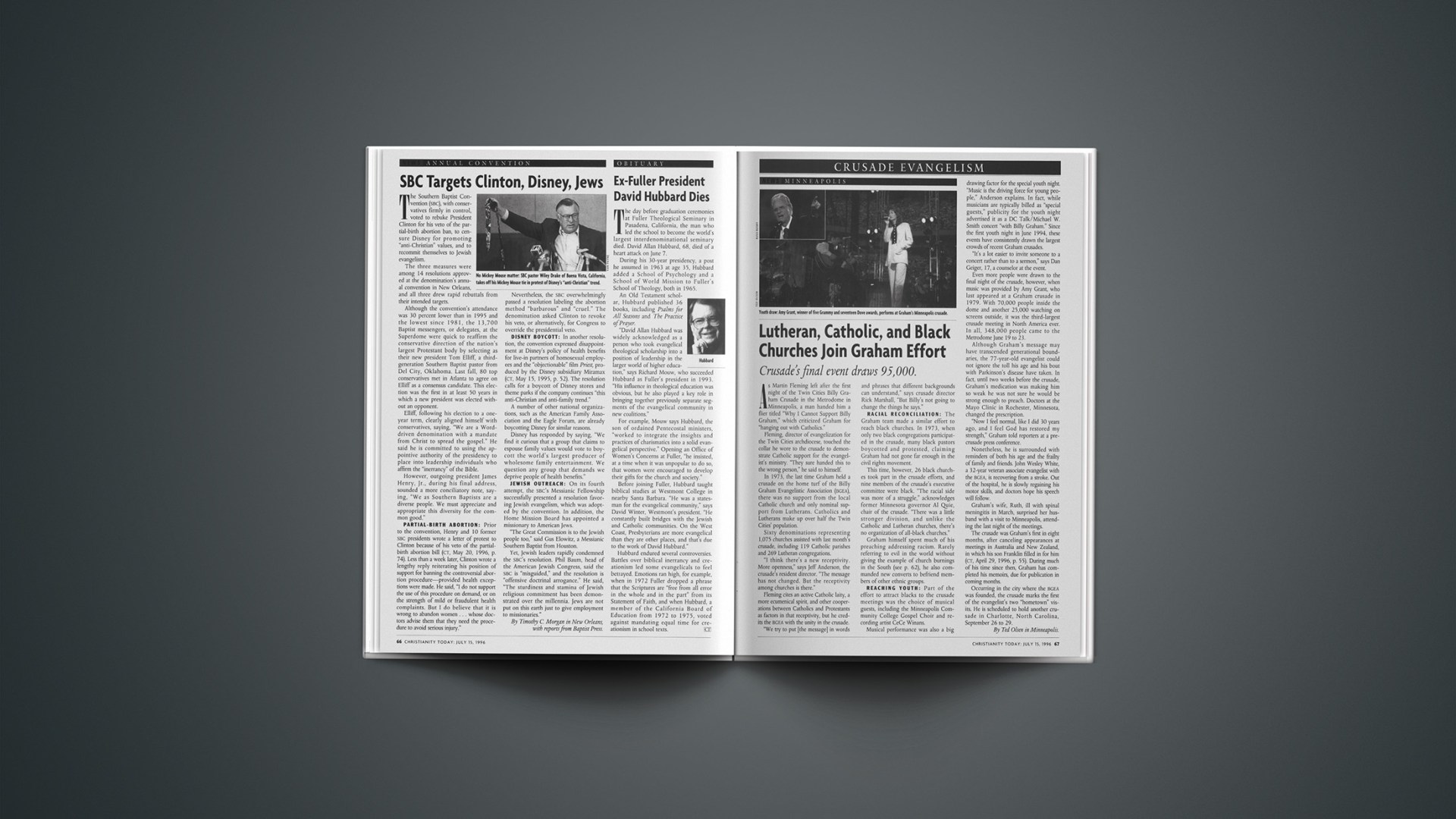As Martin Fleming left after the first night of the Twin Cities Billy Graham Crusade in the Metrodome in Minneapolis, a man handed him a flier titled “Why I Cannot Support Billy Graham,” which criticized Graham for “hanging out with Catholics.”
Fleming, director of evangelization for the Twin Cities archdiocese, touched the collar he wore to the crusade to demonstrate Catholic support for the evangelist’s ministry. “They sure handed this to the wrong person,” he said to himself.
In 1973, the last time Graham held a crusade on the home turf of the Billy Graham Evangelistic Association (BGEA), there was no support from the local Catholic church and only nominal support from Lutherans. Catholics and Lutherans make up over half the Twin Cities’ population.
Sixty denominations representing 1,075 churches assisted with last month’s crusade, including 119 Catholic parishes and 269 Lutheran congregations.
“I think there’s a new receptivity. More openness,” says Jeff Anderson, the crusade’s resident director. “The message has not changed. But the receptivity among churches is there.”
Fleming cites an active Catholic laity, a more ecumenical spirit, and other cooperations between Catholics and Protestants as factors in that receptivity, but he credits the BGEA with the unity in the crusade.
“We try to put [the message] in words and phrases that different backgrounds can understand,” says crusade director Rick Marshall, “But Billy’s not going to change the things he says.”
RACIAL RECONCILIATION: The Graham team made a similar effort to reach black churches. In 1973, when only two black congregations participated in the crusade, many black pastors boycotted and protested, claiming Graham had not gone far enough in the civil rights movement.
This time, however, 26 black churches took part in the crusade efforts, and nine members of the crusade’s executive committee were black. “The racial side was more of a struggle,” acknowledges former Minnesota governor Al Quie, chair of the crusade. “There was a little stronger division, and unlike the Catholic and Lutheran churches, there’s no organization of all-black churches.”
Graham himself spent much of his preaching addressing racism. Rarely referring to evil in the world without giving the example of church burnings in the South (see article in this issue), he also commanded new converts to befriend members of other ethnic groups.
REACHING YOUTH: Part of the effort to attract blacks to the crusade meetings was the choice of musical guests, including the Minneapolis Community College Gospel Choir and recording artist CeCe Winans.
Musical performance was also a big drawing factor for the special youth night. “Music is the driving force for young people,” Anderson explains. In fact, while musicians are typically billed as “special guests,” publicity for the youth night advertised it as a DC Talk/Michael W. Smith concert “with Billy Graham.” Since the first youth night in June 1994, these events have consistently drawn the largest crowds of recent Graham crusades.
“It’s a lot easier to invite someone to a concert rather than to a sermon,” says Dan Geiger, 17, a counselor at the event.
Even more people were drawn to the final night of the crusade, however, when music was provided by Amy Grant, who last appeared at a Graham crusade in 1979. With 70,000 people inside the dome and another 25,000 watching on screens outside, it was the third-largest crusade meeting in North America ever. In all, 348,000 people came to the Metrodome June 19 to 23.
Although Graham’s message may have transcended generational boundaries, the 77-year-old evangelist could not ignore the toll his age and his bout with Parkinson’s disease have taken. In fact, until two weeks before the crusade, Graham’s medication was making him so weak he was not sure he would be strong enough to preach. Doctors at the Mayo Clinic in Rochester, Minnesota, changed the prescription.
“Now I feel normal, like I did 30 years ago, and I feel God has restored my strength,” Graham told reporters at a precrusade press conference.
Nonetheless, he is surrounded with reminders of both his age and the frailty of family and friends. John Wesley White, a 32-year veteran associate evangelist with the BGEA, is recovering from a stroke. Out of the hospital, he is slowly regaining his motor skills, and doctors hope his speech will follow.
Graham’s wife, Ruth, ill with spinal meningitis in March, surprised her husband with a visit to Minneapolis, attending the last night of the meetings.
The crusade was Graham’s first in eight months, after canceling appearances at meetings in Australia and New Zealand, in which his son Franklin filled in for him (CT, April 29, 1996, p. 55). During much of his time since then, Graham has completed his memoirs, due for publication in coming months.
Occurring in the city where the BGEA was founded, the crusade marks the first of the evangelist’s two “hometown” visits. He is scheduled to hold another crusade in Charlotte, North Carolina, September 26 to 29.
Copyright © 1996 Christianity Today. Click for reprint information.










